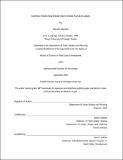| dc.contributor.advisor | David Geltner. | en_US |
| dc.contributor.author | Hayashi, Rokuhei | en_US |
| dc.contributor.other | Massachusetts Institute of Technology. Dept. of Urban Studies and Planning. | en_US |
| dc.date.accessioned | 2006-06-20T12:54:46Z | |
| dc.date.available | 2006-06-20T12:54:46Z | |
| dc.date.copyright | 2005 | en_US |
| dc.date.issued | 2005 | en_US |
| dc.identifier.uri | http://hdl.handle.net/1721.1/33187 | |
| dc.description | Thesis (S.M.)--Massachusetts Institute of Technology, Dept. of Urban Studies and Planning, 2005. | en_US |
| dc.description | This electronic version was submitted by the student author. The certified thesis is available in the Institute Archives and Special Collections. | en_US |
| dc.description | Includes bibliographical references (leaves 176-178). | en_US |
| dc.description.abstract | The German real estate open-ended fund, a major indirect real estate investment vehicle for German individual investors, is now suffering a strong pressure of globalization from its investors because of the sluggish German domestic real estate market. In order to deal with such pressure, many funds have begun to invest in the US and now looking for opportunities in Asia, especially in Japan. For a German fund which is basically a core investor with a long-term investment horizon, the Japanese market fits its investment policy because of the maturity and stability. At the same time, the low correlation with its fatherland market and the currency hedge gain in Japan is worthy of special mention, along with the recovering market. However, many funds seem to encounter difficulties in acquiring Japanese properties. Among several reasons, the most significant problem is likely to be the problem of the accessibility to deal flows. Currently, many transactions are conducted among the limited market community of participants in Japan. Otherwise bidding requires a fairly high premium on the market consensus because of the small number of publicly available transactions. Nevertheless, some foreign investors have successfully acquired properties in Japan, so the German open-ended fund will surely be able to have opportunities, too. | en_US |
| dc.description.abstract | (cont.) In this thesis, four measures are proposed: the close relationship to Japanese leading real estate companies or their intimate advisory firms, the entry in the retail sector, the participation in development projects, and the investment in PFI projects. Some of them may have already been examined by funds, but the advantages and disadvantages of these alternatives are examined from the perspective of a Japanese real estate professional, which should help German funds comprehend possibilities in the Japanese market. | en_US |
| dc.description.statementofresponsibility | by Rokuhei Hayashi. | en_US |
| dc.format.extent | 178 leaves | en_US |
| dc.format.extent | 3249187 bytes | |
| dc.format.extent | 3248999 bytes | |
| dc.format.mimetype | application/pdf | |
| dc.format.mimetype | application/pdf | |
| dc.language.iso | eng | en_US |
| dc.publisher | Massachusetts Institute of Technology | en_US |
| dc.rights | M.I.T. theses are protected by copyright. They may be viewed from this source for any purpose, but reproduction or distribution in any format is prohibited without written permission. See provided URL for inquiries about permission. | en_US |
| dc.rights.uri | http://dspace.mit.edu/handle/1721.1/7582 | |
| dc.subject | Urban Studies and Planning. | en_US |
| dc.title | German public real estate open-ended funds in Japan | en_US |
| dc.type | Thesis | en_US |
| dc.description.degree | S.M. | en_US |
| dc.contributor.department | Massachusetts Institute of Technology. Department of Urban Studies and Planning | |
| dc.identifier.oclc | 65470822 | en_US |
